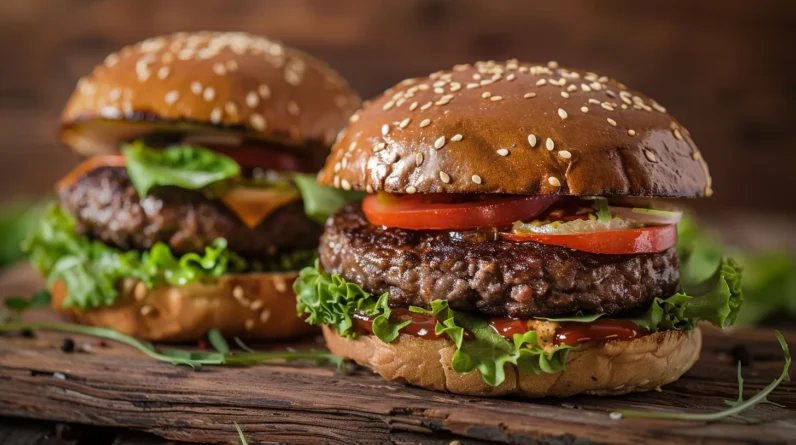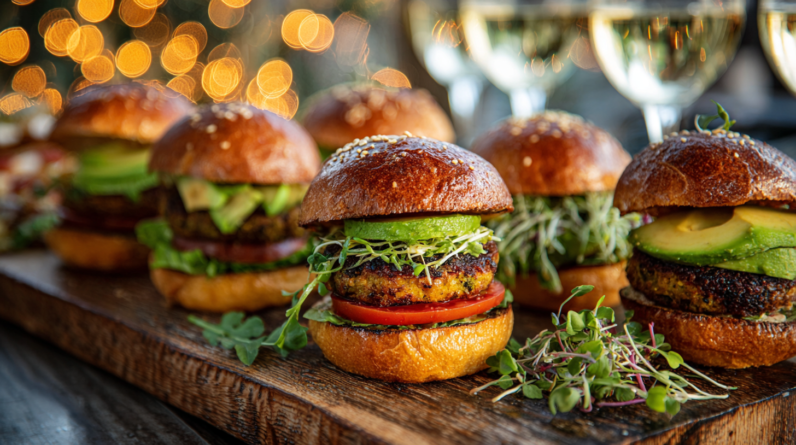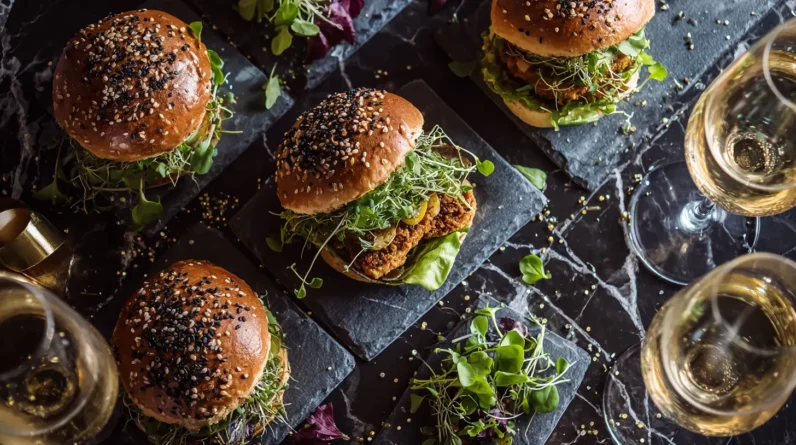
We’re calling out the unspoken biases in our food culture, and it turns out veggie burgers are more than just a meal option – they’re a reflection of our values. We’re drawn to them for health, sustainability, and taste. But let’s be real, they also reveal our prejudices. If we explore further, we’ll uncover the surprising ways our food choices expose our true selves.
Market Trends and Projections
As we explore into the market trends and projections, it’s clear that the veggie burger industry is on a tear, with the market valued at approximately $4.7 billion in 2024 and projected to reach around $8 billion by 2031 – a growth rate that’s not exactly surprising, given the rising demand for plant-based everything. Our market analysis reveals a thriving sector, driven by economic trends favoring sustainable and healthy options. We’re seeing significant expansion, with a compound annual growth rate of 7.5%-8%, indicating a robust and consistent upward trajectory, making the veggie burger market a notable player in the food industry.
Consumer Preferences and Cultural Shifts
We’re not buying into the hype that consumers are suddenly, uniformly obsessed with veggie burgers – but it’s clear that our preferences are shifting, and plant-based options are gaining traction. As we navigate the complexities of food culture, it’s evident that social influence plays a significant role. Consumers are driven by health awareness, sustainability, and taste, reflecting a cultural shift towards environmental consciousness. Our food culture is evolving, and veggie burgers are at the forefront, influenced by social media and global flavors, ultimately revealing the nuances of our collective preferences and the power of social influence on our choices.
Innovation in Plant-Based Products
While it’s easy to get caught up in the hype surrounding plant-based products, we’ll give credit where credit is due: innovation in this space is genuinely impressive. We’ve seen significant advancements in food technology, allowing for the replication of beef’s taste and texture. This culinary evolution is driven by precision fermentation and the incorporation of diverse plant sources. The result is a more complex and nuanced flavor profile, making plant-based burgers a viable option. With innovations like vegan cheese and clean-label ingredients, it’s clear that the industry is pushing the boundaries of what’s possible, and we’re enthusiastic to see what’s next.
Distribution and Market Segmentation
The veggie burger market’s impressive growth isn’t solely due to its trendy status – it’s backed by concrete numbers, with the global market valued at approximately $4.7 billion in 2024 and projected to reach nearly $8 billion by 2031. We’re witnessing a shift in social norms, with plant-based diets becoming increasingly mainstream, influencing cultural identity. Distribution channels have expanded, catering to diverse consumer preferences, from retail stores to online marketplaces. Market segmentation targets specific groups, like vegans and flexitarians, reflecting evolving consumer values and preferences that blur traditional boundaries, revealing a complex interplay between food choices and identity.
Environmental and Ethical Considerations
As we explore into the environmental and ethical considerations of veggie burgers, it’s striking that our food choices have become a battleground for conscience, with plant-based options emerging as a clear winner. We’re reshaping food systems, opting for sustainable production that reduces greenhouse gas emissions and land use. Veggie burgers use 97% less land and water than beef, making them a more eco-friendly choice. By choosing plant-based, we’re promoting ethical eating and reducing animal exploitation. It’s a win-win for the planet and our conscience, proving that sustainable production can be a reality in our food systems.
The Impact of Food Culture on Perception
Given our tendency to conflate aesthetics with nutrition, it’s no surprise we perceive visually appealing foods as healthier and lower in fat and calories. We’re suckers for food dynamics that play on our cultural narrative, where pretty foods are deemed healthier. This bias influences our perception, often overriding objective nutritional facts. Our cultural background shapes food preferences, with familiar foods receiving better health ratings. We must acknowledge how food culture impacts our perception, recognizing the role of aesthetics and cultural Conditioning in shaping our attitudes towards food, ultimately affecting our relationship with what we eat.
Breaking Down Barriers in Food Norms
We’re stuck in a loop where our perceptions of food are filtered through cultural norms, and it’s time to confront these biases head-on. Our food identity is deeply intertwined with social norms, influencing what we consider acceptable to eat. Veggie burgers, often associated with femininity, challenge traditional norms. We must break down these barriers by recognizing the cultural attachments that shape our food choices. By doing so, we can broaden our understanding of food identity and transcend outdated social norms, ultimately embracing a more inclusive and diverse food culture that values sustainability and health. This shift requires a thoughtful overhaul.
Conclusion
We’ve come to realize that you can’t judge a book by its cover, or in this case, a patty by its ingredients. The veggie burger phenomenon exposes deep-seated biases in food culture, proving that old habits die hard – but they do die. As the saying goes, “variety is the spice of life,” and it’s about time our plates reflected that.







